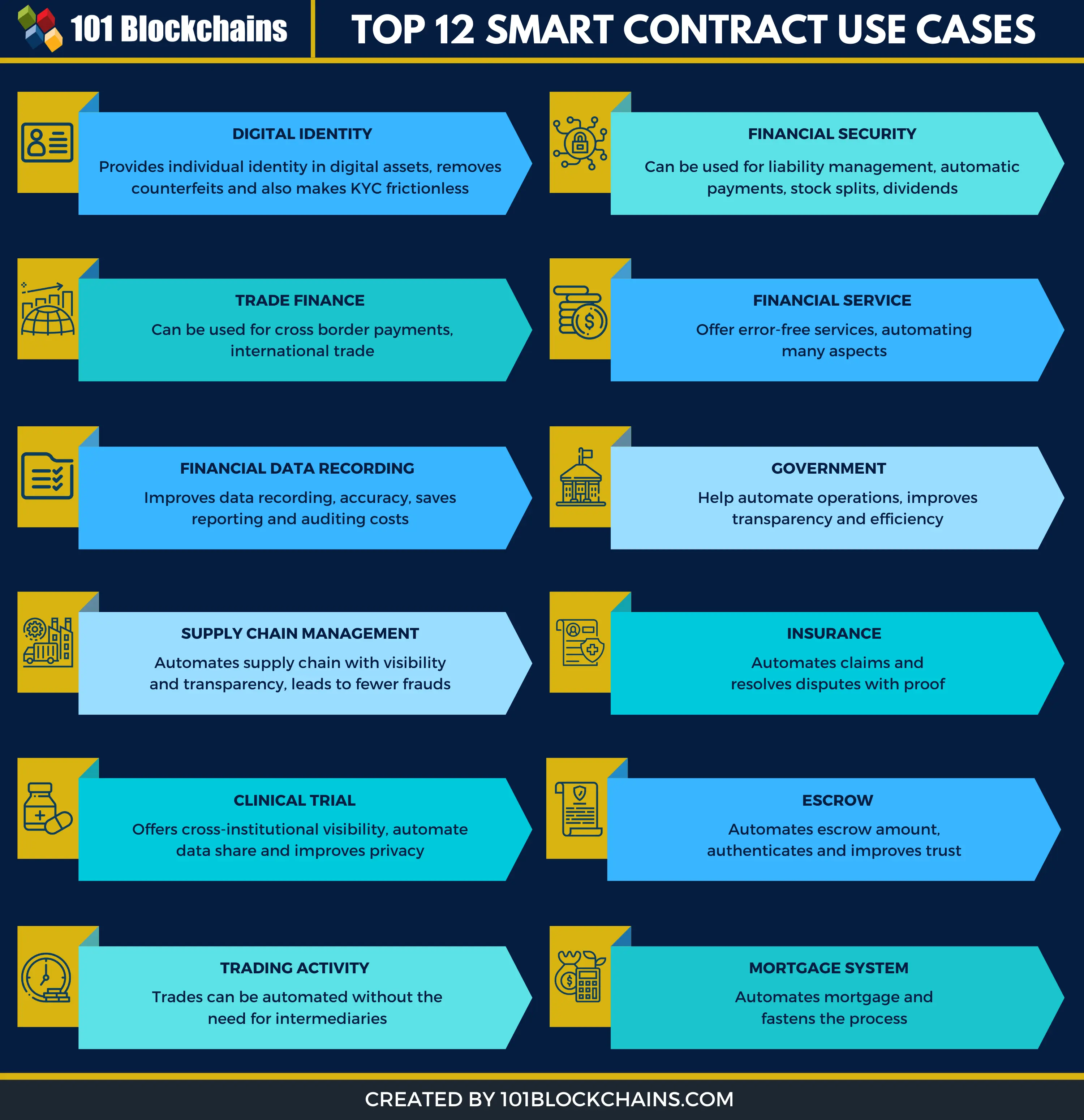Learn how blockchain truly works, master key definitions, and uncover what makes smart contracts so "smart." Dive into the fundamentals, gain valuable insights, and start your blockchain journey today!

- Solidity & Smart Contracts
Diego Geroni
- on September 16, 2021
Top 12 Smart Contract Use Cases
If you are new to smart contracts, you might not be sure of its capability. This article will try to clear all your confusions by sharing the best smart contract use cases out there.
Smart contracts are the result of blockchain evolution. With blockchain’s invention via bitcoin, it was clear that it is a primitive type of blockchain technology. However, it did introduce the powerful concept of decentralization and how it can be used to solve a multitude of problems across different industries.
With time, Ethereum was released by Gavin Wood and Vitalik Buterin in 2015. It started the second generation of blockchain technology, which introduced new concepts and techniques to handle distributed ledgers. One of those techniques included smart contracts that brought automation to the whole blockchain network.
To facilitate the process of writing smart contracts, it also introduced scripting. One such language that can be used to write smart contracts in Solidity. Other smart-contract languages also let a developer write and deploy a smart contract. Let’s define smart contracts to get a better understanding.
Curious to understand the complete smart contract development lifecycle? Enroll now in Smart Contracts Development Course!
Smart Contracts Use Cases: What Are Smart Contracts? How Do They Work?
Smart contracts can be defined as paperless digital code that offers a set of promises on predefined conditions that the parties have agreed to.
In simple words, the parties can set a condition that can start an action or a series of actions when met.
Smart contracts can be used in a real-estate deal. Both the parties (buyer and seller) can create a smart contract that can automate the deal once the buyer pays the property value to the seller. To make all of these happen, the property first needs to be digitized on blockchain technology. Once done, both parties can carry their deal using smart contracts.
This simple idea is more than enough to automate tasks or the whole network, such as decentralized autonomous organizations that utilizes a set of smart contracts. However, this idea always doesn’t end well. The DAO event didn’t end well as a hacker stole $50 million. To curb the problem, the chain was split using a hard fork.
Build your identity as a certified blockchain expert with 101 Blockchains’ Blockchain Certifications designed to provide enhanced career prospects.
What Are the Benefits of Smart Contracts?
Our next section deals with the benefits of smart contracts. By learning about its benefits, you will be able to make the most out of what smart contracts have to offer and hence get a better understanding of smart contract use cases.
The key benefits of smart contracts include the following:
-
Autonomous
The biggest benefit of smart contracts is the automation that it offers. In simple terms, it means that it is interruption-free, and no third party can make changes in the agreement and decision. This automation can go a long way as it helps organizations to automate certain aspects of their business. Not only that, it resolves issues in some processes where trust is an issue.
-
Secured
Another aspect of smart contracts that makes them amazing is their security. It enables processes to work in a secure manner. The encryption also makes smart contracts work as intended. As smart contracts run on networks with immutable data, the data generated by them cannot be changed or altered in any way. This way, all information is kept secure.
-
Interruption Free
Smart contracts are interruption-free. This means that once they are started execution, they cannot be stopped or interrupted.
-
Trustless
The whole system is trustless. This means that there is no need to trust other parties. Sounds counter-intuitive? Well, in simple words, it means that there is no need to trust the parties to carry out a transaction. A transaction or a trade does not require trust as its integral part. As smart contracts run on a decentralized network, this means that the whole network is trustless.
Start learning Smart Contracts and its development tools with World’s first Smart Contracts Skill Path with quality resources tailored by industry experts Now!
-
Cost-effective
Smart contracts make transactions more cost-effective. This is done with the removal of intermediaries from the process. By doing so, it makes the transactions faster and also removes the cost associated with it.
-
Fast Performance
The autonomous smart contracts executed way faster compared to the old fashioned traditional approach. As all the parameters are already defined within the smart contracts, it only needs to match them before it starts executing.
-
Accurate and Error-Free
Lastly, smart contracts are error-free and accurate. The only issue is that they need to be coded correctly so that they execute error-free. For example, if you are filing your taxes, you can make errors while doing so. However, if you use a smart contract to do it for you, then it will be an error-free approach.
Want to know the real-world examples of smart contracts and understand how you can use it for your business? Check the presentation Now on Examples Of Smart Contracts
What Is the Best Use Case for Smart Contracts?
In reality, smart contract use case can vary from sector to sector based on where companies are using them. So, let’s see what these are –
Please include attribution to 101blockchains.com with this graphic. <a href='https://101blockchains.com/blockchain-infographics/'> <img src='https://101blockchains.com/wp-content/uploads/2020/04/smart-contract-use-case.png' alt='smart contract use cases='0' /> </a>
Watch This Video To Know About Examples of Smart Contracts Right Now!
-
Digital Identity
One of the most obvious smart contract use cases is Digital Identity. Individual identity is one of the biggest assets for that individual. It contains reputation, data, and digital assets. The digital identity, if used rightly, can bring new opportunities to the person. Also, digital identity can also help protect the identity from counterparties and enable him to share it with companies that he intends.
For now, the internet allows you to connect to multiple services, but at the same time, unknowingly sharing your identity with the companies and they’re associated with having your identity mapped.
In this case, smart contracts can help counterparties learn about the individual without knowing their true identity or verify transactions. This frictionless KYC can help improve interoperability, resilience, and compliance — all with the use of smart contracts.
Want to understand the concept of decentralized identity in detail? Enroll now in Decentralized Identity Fundamentals Course!
-
High Securities
Another one of the useful smart contract real use cases includes securities. With smart contracts, capitalization table management can be simplified and improved. This means that there are no intermediaries between the parties, including security custody chains. It can also be used for dividends, automatic payments, liability management, and stock splits.
Also, smart contracts can help reduce operational risk and make workflows digitized.
-
Cross Border Payments
Trade Finance can also be revolutionized with the help of smart contracts. There is no doubt that it can help in international goods transfer and trade payment initiations with the use of a Letter of Credit.
Clearly, using smart contracts will improve the liquidity of the financial assets, in return, improving the suppliers, buyers, and institutions’ financial efficiencies.
To make smart contracts work in Trade finance, especially in cross-border payments and international trade, it is necessary to find an industry standard and implement it accordingly.
With proper integration, it can surely solve legal complications and offers a better way to solve disputes among parties.
-
Loans and Mortgages
Smart contracts can also help improve financial services, including mortgages and loans. To do so, it can connect the parties and ensure that the whole process can be completed in a friction-less way. Moreover, it also provides an error-free process. For instance, the smart contract set up to handle a mortgage can manage it by tracking the payments and releasing the property when the whole loan is paid off.
One more benefit from using smart contracts in financial services is visibility to all the involved parties.
This use case also falls under the Ethereum smart contract use cases.
-
Financial Data Recording
Financial data is very important for any organization. And, this is where the smart contracts come in. They provide the necessary way to data records for a more accurate and transparent financial data collection. With smart contracts, it is easy to manage the uniform recording of data across an organization resulting in reduced auditing costs and reporting.
Finally, it also results in reduced accounting costs and better interoperability among legacy networks and distributed ledger networks.
Not sure which parts of trade finance operations can benefit from enterprise blockchain applications? Enroll Now: Enterprise Blockchains and Trade Finance Course
-
Government
Smart contracts help automate. That’s where it can help the government to manage operations. One of those operations includes land title recording where the government can use to do property transfers.
Land Title Recording requires parties to transfer property with efficiency and transparency. Smart contracts can help do so. Also, using it will reduce auditing costs and also improve transparency within the whole system.
Another use case for government, includes electronic elections, the digital identity that we discussed earlier, and electronic record filing.
Governments can explore more smart contract use cases based on their requirement.
Curious about blockchain’s impact on governments? Check out our guide on blockchain for the government right now!
-
Supply Chain Management
Supply chain management is a great, blockchain smart contract use case. By using smart contracts, the supply chain can be improved manifold. For example, it can be used to track items within the supply chain with full visibility and transparency. A business can use smart-contract-powered supply chains and improve its inventory tracking to a granular level.
It also improves other aspects of the business, which are directly connected with the supply chain. Moreover, using smart contracts also means a reduction in verification and enhanced tracing results in fewer frauds and thefts. However, to make it work, the institutions need to add additional equipment, including sensors, to their supply chain. More so, it’s a smart contract application example.
Want to understand which parts of a supply chain can benefit from enterprise blockchain applications? Enroll Now: Enterprise Blockchains and Supply Chain Management Course
-
Insurance
Insurance has always been one of the most use cases of smart contracts. It is a known fact that most of the disputes happen in the insurance sector. For example, let’s take auto insurance as an example. Here, smart contracts can be used to settle the insurance as soon as possible.
To do so, smart contracts need to utilize a lot of technology, including Internet-of-Things, to facilitate themselves. The smart contract will facilitate the policy and make sure that it has all the proper documentation, including driver reports and driving records, with the use of the technology. If the smart contract is set up with the right policy, documents, and ways to capture data, it can execute itself shortly after the accident. Also, smart contract execution is only done based on the collected data, which ensures that no fraud is done in the process.
The insurance sector can genuinely take advantage of smart contracts and hence is one of the best smart contract use cases out there. More so, it’s a smart contract application example.
Curious about blockchain’s impact on insurance? Check out our guide on blockchain in insurance right now!
-
Clinical Trials
Clinical trials can also improve with smart contracts as they can improve cross-institutional visibility. It can also automate the data sharing between institutions, thanks to the automation and privacy-preserving computations it can do. This is one of the real-world examples of smart contracts.
Moreover, smart contracts can also be used to automate trials and share information across-industry. To be precise, it can help in identity, authorization, and authentication of the data.
-
Escrow
The last use-case that we are going to discuss is escrow. Escrows are the process of storing value between the parties when the contract is still active. For this, the action is taken by the payer to release the funds. However, in the case of smart contract usage, it will be possible to automate the whole thing as soon as the service provider submits its work and authenticates it.
The smart contracts can be very useful for platforms such as Upwork or other freelancing platforms where the platform’s escrow amount is held. There are many companies using smart contracts for this purpose.
-
Record Storage
Smart contract database can be used to record information and also do digitization of real-world assets. You can use a smart contract database to store the records and renew them and release them according to the set parameters. All of these can be done automatically. This is one of the real world examples of smart contracts.
-
Trading Activities
Another use case of smart contracts in trade finance is trading activities. In this case, the middleman or broker is removed, and his work is automated with the smart contract. This removes the additional cost related to them. There are many companies using smart contracts for this purpose.
-
Mortgage System
Smart contracts can be effectively used in the mortgage system. It enables mortgages to be automated and ease both the owner and the buyer. To make all of these happen, smart contracts need to be coded according to the mortgage agreement. Once done, the smart contracts can be set into motion, and each step in the process can be automatically executed. The whole process is fast, cheap, and easy. This is one of the real world examples of smart contracts.
Conclusion
This leads us to the end of our smart contract use case article. Smart contracts are essential for our economy as they can provide the necessary automation for decentralized platforms. Smart contracts provide a unique way of solving problems, including escrow, clinical trials, insurance, government processes, and so on!
All these use-cases also fall under the Ethereum smart contract use cases and blockchain smart contract use cases. So, if you are looking for those, then the article we also went through the features of smart contracts so that you can understand the smart contract use-cases better. If you want to learn more about smart contracts, we recommend checking out our free blockchain course.






